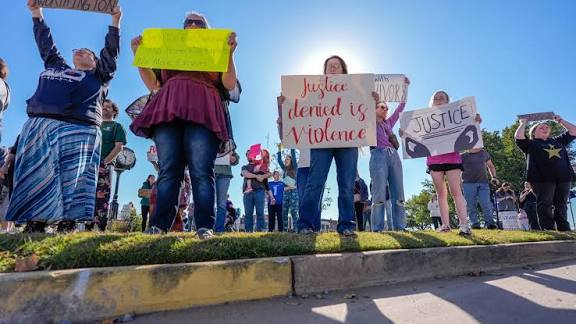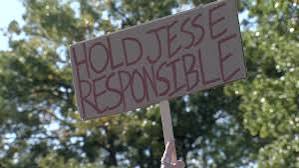Jesse Butler plea deal: Case of teen rapist,Oklahomans protest

Photos show more than a hundred people holding signs demanding justice outside the Payne County Courthouse on Wednesday. Today we will discuss about Jesse Butler plea deal: Case of teen rapist,Oklahomans protest
Jesse Butler plea deal: Case of teen rapist,Oklahomans protest
In early 2024, Stillwater, Oklahoma, became the center of a highly publicized criminal case involving Jesse Mack Butler, then 17 years old. Butler was investigated following allegations by two teenage girls accusing him of repeated sexual assaults. According to court records, these alleged crimes included rape, sexual battery, strangulation, and violation of protective orders.
One victim reported that Butler had repeatedly raped her and strangled her, with medical testimony indicating she might have died if the strangulation had continued for another thirty seconds. The other alleged victim described similar violence, including being choked until she passed out, with Butler even allegedly recording the acts.
The charges initially filed included multiple counts of attempted rape in the first degree, rape by instrumentation, sexual battery, forcible oral sodomy, domestic assault and battery by strangulation, and violation of a protective order. If convicted as an adult, Butler faced a potential sentence of approximately 78 years in prison.
However, the case took a controversial turn when a plea deal was reached that drastically altered the potential outcome.
The Plea Deal and Youthful Offender Status

Rather than proceeding to a full adult trial, Butler’s legal team negotiated a plea agreement with the prosecution. In July 2025, the court approved reclassifying Butler under Oklahoma’s youthful offender statute rather than trying him fully as an adult, citing that he was 17 at the time of the alleged offenses.
On August 25, 2025, Butler entered a plea of no contest to 10 rape-related counts and one count of violating a protective order. While the court technically imposed a sentence of 78 years, the prison term was suspended under the youthful offender program. Butler’s sentence would remain suspended as long as he complied with a structured rehabilitation plan until his 19th birthday.
The program includes strict conditions such as:
Completing over 100 hours of community service.
Adhering to a curfew, limiting social media, performing daily check-ins, and attending weekly counseling.
Participating in therapy and remaining under supervision until age 19.
Violating any of these terms could reactivate the full 78-year sentence. If Butler successfully completes the program, he could avoid incarceration entirely, and some of his records may eventually be expunged.
This arrangement effectively allows Butler to avoid prison time despite convictions related to multiple violent sexual assaults, contingent on his compliance with the conditions.
Why the Plea Deal Sparked Outrage
The decision to offer Butler a youthful offender plea deal drew widespread condemnation for several reasons.
Severity of the Crimes
The nature of the alleged assaults—repeated rape, strangulation, and recording of the attacks—was particularly brutal. Victims’ families expressed that the plea deal felt like a profound betrayal, emphasizing the physical and emotional trauma inflicted on the girls. Many argued that the seriousness of the crimes merited adult sentencing.
Perception of Privilege
Butler’s father is a former director of football operations at Oklahoma State University, and critics have suggested that family influence may have affected how the case was handled. The notion that social status played a role in the leniency of the sentence fueled public anger and concerns about unequal treatment under the law.
Misapplication of Youthful Offender Law
Oklahoma’s youthful offender statute is designed for first-time, less severe offenses, not repeated violent sexual assaults. Many legal analysts and victim advocates argued that applying this statute in Butler’s case undermined the statute’s intended purpose and allowed him to avoid meaningful consequences.
Impact on Victims and Community Trust
The plea deal significantly affected public perception of justice. During a protest outside the Payne County District Court, dozens of residents, many of whom were sexual assault survivors, voiced anger at the decision. Protesters carried signs reading “No justice, no peace” and “No contest, no consequence.” Many expressed that the case set a troubling precedent for how violent offenders are treated.
The community outrage highlighted the disconnect between public expectations of justice and the legal outcomes of this case.
Community Reaction and Protest
The protest in Stillwater drew survivors of sexual violence, their allies, and concerned citizens. Attendees expressed frustration over a system they perceived as prioritizing the rights of offenders over the safety and justice of victims.
One survivor spoke passionately:
“I feel terrible for those young women … almost losing your life … and your assaulter being able to just walk with no punishment … that’s just ridiculous.”
Another protester emphasized that the victims had effectively been silenced, with no real consequence for Butler. Social media commentary echoed this sentiment, with many arguing the plea deal sent a dangerous message to future victims.
The case also prompted scrutiny of local schools and police departments, which investigated potential safety concerns linked to the situation. Lawmakers publicly criticized the plea deal, calling it unacceptable and promising a review of prosecutorial decision-making.
Understanding the Youthful Offender Statute in Oklahoma
To grasp why Butler avoided adult prison, it’s essential to understand Oklahoma’s youthful offender law.
What Is a Youthful Offender?
The youthful offender statute provides an alternative to adult prosecution for individuals under 18 who commit certain crimes. Its aim is rehabilitative, giving young offenders an opportunity to reform under supervision rather than through lengthy incarceration.
Application in Butler’s Case
Because Butler was 17 at the time of the offenses, the DA and court applied youthful offender status. Officials emphasized that this did not erase the crimes but allowed Butler to remain in a supervised, rehabilitative program.
Critics argued that the statute’s application was inappropriate given the severity and violent nature of Butler’s alleged crimes. They noted that the law’s original intent was for non-violent, first-time offenders, not cases involving repeated sexual assault and near-fatal strangulation.
Enforcement and Consequences
Under the plan:
Butler remains under juvenile supervision until age 19.
Compliance with therapy, curfew, and community service allows him to avoid incarceration.
Violations could reactivate the original 78-year sentence.
One concern raised by advocates is that after Butler turns 19, supervision ends. If the rehabilitation does not succeed, community safety could be at risk, and there is no continued oversight.
Broader Implications of the Case
This case has broader ramifications for criminal justice policy, community trust, and victim advocacy.
Accountability and Victim Rights
Critics argue that plea deals like Butler’s undermine accountability. Victims lose the chance to testify publicly, and the absence of a visible court trial can leave communities questioning whether justice was served.
Social Equity Concerns
The perception that Butler’s family status influenced his leniency raises questions about equity in the legal system. Public confidence in fair treatment under the law may erode when privilege appears to shield offenders from full consequences.
Safety and Recidivism
Sexual offenders who commit violent crimes are statistically more likely to reoffend if not properly monitored. Critics of the youthful offender deal warn that the limited supervision period may not be sufficient to prevent future offenses.
Legislative and Prosecutorial Oversight
Lawmakers and public advocates are calling for a review of how the DA’s office handles serious cases involving youthful offenders. The Butler case has sparked discussion about tightening rules for applying the statute to violent crimes.
Community Trust in the Justice System
Protests, public outcry, and media coverage highlight the tension between legal outcomes and public expectations. Survivors of sexual violence, in particular, may feel disillusioned when serious offenses appear to result in leniency.
What Happens Next
Key developments are expected in the coming months:
Compliance Hearing: Scheduled for December 8, 2025, the court will assess whether Butler has adhered to all terms of his rehabilitation plan.
Policy Review: Local lawmakers and advocates may push for changes to the youthful offender statute, limiting its use in violent sexual assault cases.
Ongoing Oversight: Schools, law enforcement, and the community remain vigilant, monitoring potential risks or incidents related to the case.
The outcomes of these developments could shape how Oklahoma handles similar cases in the future, particularly regarding violent offenses committed by minors.
Conclusion: Balancing Justice and Rehabilitation
The Jesse Butler case illustrates the complex interplay between juvenile law, rehabilitation, and public expectations of justice. While youthful offender statutes aim to give young people a chance to reform, the severity of Butler’s alleged crimes raised questions about whether such leniency is ever appropriate.
For survivors, families, and the broader community, the plea deal has become a symbol of perceived inequity and injustice. Critics argue that violent sexual assaults require adult-level consequences, while advocates for youthful offender programs emphasize rehabilitation and the developmental capacity for change in teenagers.
The case has ignited ongoing debate about how to balance rehabilitation, accountability, and public safety. Regardless of the outcome of Butler’s compliance hearing, the attention and outcry surrounding the case are likely to influence prosecutorial practices, legislative changes, and public trust in Oklahoma’s justice system for years to come.
Ultimately, the Jesse Butler case serves as a stark reminder of the challenges inherent in balancing youthful rehabilitation with the need for justice in cases of severe violence. Communities, lawmakers, and legal professionals are now tasked with finding solutions that respect victims, protect society, and uphold the principles of fairness and accountability.
How useful was this post?
Click on a star to rate it!
Average rating 0 / 5. Vote count: 0
No votes so far! Be the first to rate this post.
About the Author
usa5911.com
Administrator
Hi, I’m Gurdeep Singh, a professional content writer from India with over 3 years of experience in the field. I specialize in covering U.S. politics, delivering timely and engaging content tailored specifically for an American audience. Along with my dedicated team, we track and report on all the latest political trends, news, and in-depth analysis shaping the United States today. Our goal is to provide clear, factual, and compelling content that keeps readers informed and engaged with the ever-changing political landscape.




